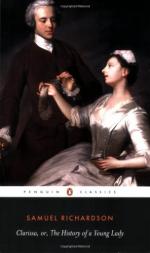Going abroad, Madam?—with an air of indifference.
Yes, Sir: I intend to go to church.
I hope, Madam, I shall have the honour to attend you.
No: she designed to take a chair, and go to the next church.
This startled me:—A chair to carry her to the next church from Mrs. Sinclair’s, her right name not Sinclair, and to bring her back hither in the face of people who might not think well of the house!—There was no permitting that. Yet I was to appear indifferent. But said, I should take it for a favour, if she would permit me to attend her in a coach, as there was time for it, to St. Paul’s.
She made objections to the gaiety of my dress; and told me, that if she went to St. Paul’s, she could go in a coach without me.
I objected Singleton and her brother, and offered to dress in the plainest suit I had.
I beg the favour of attending you, dear Madam, said I. I have not been at church a great while; we shall sit in different stalls, and the next time I go, I hope it will be to give myself a title to the greatest blessing I can receive.
She made some further objections: but at last permitted me the honour of attending her.
I got myself placed in her eye, that the time might not seem tedious to me, for we were there early. And I gained her good opinion, as I mentioned above, by my behaviour.
The subject of the discourse was particular enough: It was about a prophet’s story or parable of an ewe-lamb taken by a rich man from a poor one, who dearly loved it, and whose only comfort it was: designed to strike remorse into David, on his adultery with Uriah’s wife Bathsheba, and his murder of the husband. These women, Jack, have been the occasion of all manner of mischief from the beginning! Now, when David, full of indignation, swore [King David would swear, Jack: But how shouldst thou know who King David was?—The story is in the Bible,] that the rich man should surely die; Nathan, which was the prophet’s name, and a good ingenious fellow, cried out, (which were the words of the text,) Thou art the man! By my soul I thought the parson looked directly at me; and at that moment I cast my eye full on my ewe-lamb.—But I must tell thee too, that, that I thought a good deal of my Rosebud.—A better man than King David, in that point, however, thought I!
When we came home we talked upon the subject; and I showed my charmer my attention to the discourse, by letting her know where the Doctor made the most of his subject, and where it might have been touched to greater advantage: for it is really a very affecting story, and has as pretty a contrivance in it as ever I read. And this I did in such a grave way, that she seemed more and more pleased with me; and I have no doubt, that I shall get her to favour me to-morrow night with her company at my collation.




